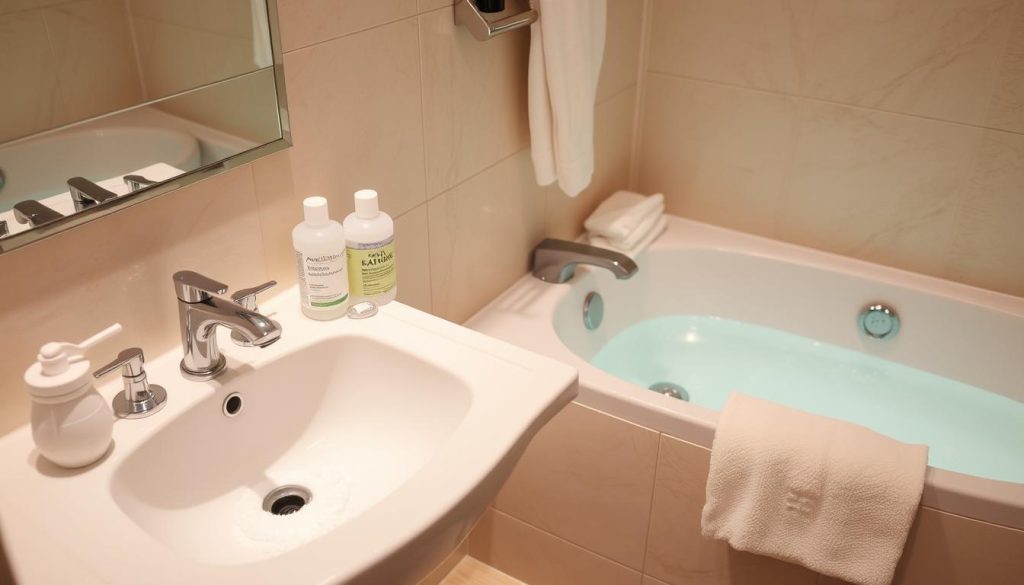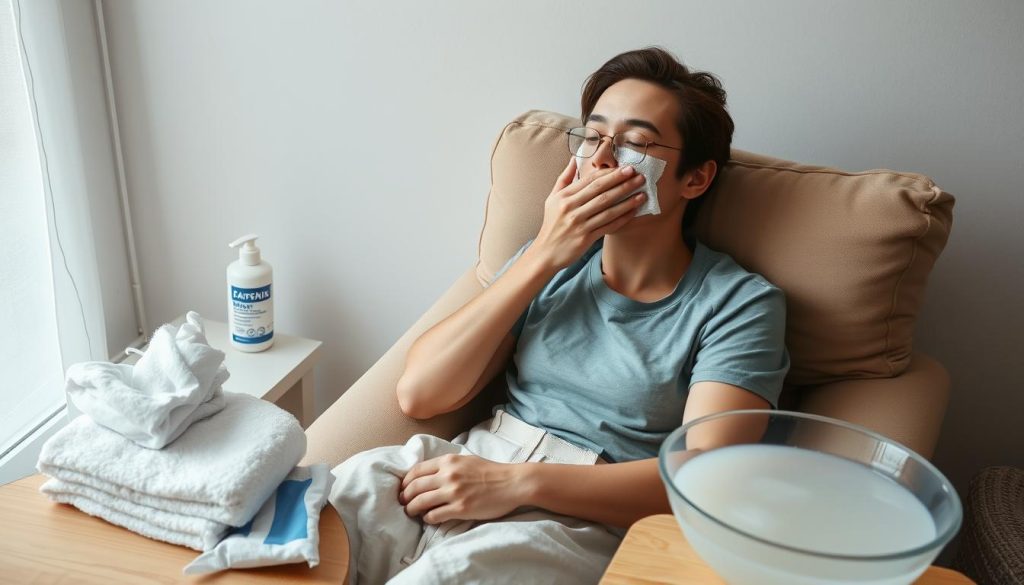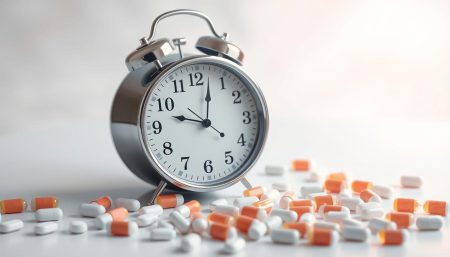Dealing with a perianal abscess can be uncomfortable and concerning. While some cases may require medical intervention, many people find relief through non-surgical methods. This guide focuses on perianal abscess treatment without surgery, providing valuable home care tips to manage this condition effectively.
Perianal abscesses are localized infections near the anus that can cause pain and discomfort. By exploring conservative approaches and home care strategies, many individuals successfully manage their symptoms and promote healing. These methods often include warm sitz baths, proper hygiene practices, and dietary adjustments.
In the following sections, we’ll explore the causes, symptoms, and various non-surgical treatment options for perianal abscesses. By understanding these aspects, you’ll be better equipped to handle this condition and potentially avoid more invasive procedures.
Understanding Perianal Abscess: Causes and Symptoms
Perianal abscesses can be quite painful. Knowing what causes them and their symptoms is key to treating them early. Let’s look at the common reasons and how to spot them.
Common Causes of Anal Gland Obstruction
Anal gland obstruction often leads to perianal abscesses. These glands can get blocked for several reasons:
- Poor hygiene practices
- Chronic constipation or diarrhea
- Inflammatory bowel diseases
- Trauma to the anal area
Early Warning Signs and Symptoms
Spotting the early signs of a perianal abscess is important. Look out for:
- Pain or discomfort around the anus
- Swelling or redness in the perianal area
- Difficulty sitting or having bowel movements
- Fever or chills
Risk Factors and Prevention
Some factors can make you more likely to get a perianal abscess:
| Risk Factor | Prevention Strategy |
|---|---|
| Obesity | Maintain a healthy weight |
| Diabetes | Control blood sugar levels |
| Poor hygiene | Practice good anal hygiene |
| Sedentary lifestyle | Stay active and exercise regularly |
Understanding these factors can help prevent anal gland obstruction. This can lower your risk of getting a perianal abscess. If you notice symptoms, consider non-surgical treatment options first.
Perianal Abscess Treatment Without Surgery: Conservative Approaches
Looking for ways to treat a perianal abscess without surgery? There are options that don’t involve surgery. These methods aim to manage symptoms and help the body heal naturally. They work well for mild to moderate abscesses.
Warm sitz baths are a common choice. You sit in a shallow bath of warm water for 10-15 minutes, several times a day. This increases blood flow, reducing pain and swelling. Adding Epsom salts can make the bath even more effective.
Herbal compresses are another natural remedy. A warm compress made with chamomile or calendula can soothe the area and aid in healing. These herbs have anti-inflammatory properties that help ease discomfort.
- Tea tree oil application (diluted with a carrier oil)
- Garlic poultices for their antibacterial properties
- Turmeric paste to reduce inflammation
Over-the-counter pain relievers like ibuprofen or acetaminophen can help with pain. Doctors might also prescribe antibiotics to prevent or treat infection without surgery.
Keeping the area clean is key during treatment. Use mild soap and warm water, then dry it well. Wearing loose, breathable clothes also helps by reducing friction and moisture.
“While conservative treatments can be effective, it’s essential to consult a healthcare professional before attempting any perianal abscess treatment without surgery. They can assess the severity of your condition and recommend the most appropriate course of action.”
Essential Home Care Guidelines for Managing Perianal Abscess
Proper care at home is key to managing a perianal abscess. This guide offers tips for good hygiene and comfort.
Daily Hygiene Practices
Keeping the area clean is vital to prevent infection. Wash the perianal region gently with warm water at least twice a day. Pat dry with a soft, clean towel to avoid irritation.
Wear loose-fitting, breathable cotton underwear. This reduces moisture and friction.
Proper Cleaning Techniques
Use a gentle, circular motion when cleaning. Avoid harsh scrubbing, which can cause irritation. After bowel movements, use unscented, alcohol-free wipes or soft toilet paper.

Recommended Cleansing Products
Choose mild, fragrance-free soaps or cleansers for sensitive skin. Avoid products with alcohol or harsh chemicals. Some good options include:
| Product Type | Benefits | Usage |
|---|---|---|
| Unscented baby wipes | Gentle, pre-moistened | Use after bowel movements |
| Sitz bath solution | Soothing, antibacterial | Add to warm bath water |
| Witch hazel pads | Anti-inflammatory, cooling | Apply directly to affected area |
By following these hygiene practices, you can manage symptoms and support healing at home. Always consult your healthcare provider if pain or signs of infection persist.
The Benefits of Warm Sitz Baths for Perianal Healing

Warm sitz baths are key in treating perianal abscesses. They involve sitting in warm water to ease the pain. This method helps reduce pain, improves blood flow, and helps the abscess drain naturally.
To make a sitz bath, fill a clean bathtub or a sitz bath container with warm water. The water should be around 100-105°F (37-40°C). Sit in the water for 15-20 minutes, making sure the perianal area is covered.
For the best results, do sitz baths 3-4 times a day. After each bath, dry the area gently with a clean towel. Don’t rub the skin, as it can cause irritation. Regular sitz baths can greatly improve comfort and healing for those with perianal abscesses.
| Benefit | Description |
|---|---|
| Pain Relief | Warm water soothes inflamed tissues, reducing discomfort |
| Improved Circulation | Increases blood flow to the affected area, promoting healing |
| Natural Drainage | Helps draw out pus and debris from the abscess |
| Relaxation | Eases muscle tension in the perianal region |
While sitz baths are helpful, they should be part of a full treatment plan. If symptoms don’t get better or get worse, see a healthcare professional for more help and options.
Natural Remedies and Herbal Solutions for Abscess Management
Natural remedies can help with perianal abscesses. They’ve been used for ages and can work well with doctor’s advice. Let’s look at some good options.
Effective Herbal Compresses
Herbal compresses can help with swelling and pain. A warm tea tree oil compress is a favorite. Mix tea tree oil with warm water, soak a cloth, and apply it for 10-15 minutes. Do this 2-3 times a day.
Essential Oils for Relief
Some essential oils have antibacterial properties that help with healing. Lavender and frankincense oils are great for soothing. Always mix these oils with a carrier oil before using on your skin.

Traditional Healing Methods
Older remedies include turmeric paste and aloe vera gel. Turmeric can reduce swelling, and aloe vera soothes the skin. Try applying these directly to the abscess for relief.
| Natural Remedy | Benefits | Application |
|---|---|---|
| Tea Tree Oil Compress | Antimicrobial, reduces inflammation | Apply warm compress 2-3 times daily |
| Lavender Essential Oil | Soothing, promotes healing | Dilute and apply topically |
| Turmeric Paste | Anti-inflammatory | Apply directly to affected area |
| Aloe Vera Gel | Soothes irritated skin | Apply gel to abscess area |
While natural remedies can be beneficial, always talk to a doctor first. They should work alongside, not instead of, medical advice.
Dietary Modifications to Support Healing Process
Eating the right foods is key to healing from a perianal abscess. The right diet boosts your immune system and helps you heal faster. Let’s look at the foods that can help.
Foods to Include
Add these nutrient-rich foods to your diet:
- High-fiber fruits and vegetables
- Lean proteins like fish and chicken
- Probiotic-rich foods such as yogurt
- Whole grains for sustained energy
Foods to Avoid
Avoid these foods that can slow healing:
- Spicy foods that can irritate the anal area
- Processed snacks high in unhealthy fats
- Sugary drinks and desserts
- Alcohol and caffeine
Hydration Requirements
Drinking enough water is essential for healing. Aim for 8-10 glasses a day. It helps flush out toxins and keeps your digestive system working well.
| Nutrient | Benefits | Food Sources |
|---|---|---|
| Vitamin C | Boosts immune function | Citrus fruits, berries, leafy greens |
| Zinc | Supports wound healing | Nuts, seeds, lean meats |
| Protein | Aids tissue repair | Fish, poultry, legumes |
By sticking to these dietary tips, you can help your body heal faster from a perianal abscess.
Pain Management Strategies and Relief Methods
Managing pain from a perianal abscess can be tough. It’s key to find ways to ease discomfort for healing. This part looks at different ways to lessen pain and help the body heal.
Relaxation techniques are vital for pain control. Deep breathing and meditation can cut down stress and tension. These can make pain feel better.
How you sit or lie down also matters. Using a donut cushion or lying on your side with a pillow can help. These positions ease pressure on the sore area.
For some, over-the-counter pain meds work. Acetaminophen and ibuprofen are popular choices. Always follow the dosage and talk to a doctor if pain doesn’t get better.
| Pain Relief Method | Benefits | Considerations |
|---|---|---|
| Warm sitz baths | Soothes inflammation, promotes healing | Use clean, warm water for 10-15 minutes |
| Cold compresses | Numbs area, reduces swelling | Apply for short periods, wrap in cloth |
| Topical anesthetics | Provides localized numbness | Use as directed, avoid overuse |
If pain is too much, get medical help. A doctor can check and suggest the best treatment for pain relief.
Over-the-Counter Medications and Their Role
Managing a perianal abscess often involves a mix of treatments. Over-the-counter medications can help ease discomfort and aid in healing. Let’s look at some options that may offer relief.
Recommended Pain Relievers
Pain from a perianal abscess can be severe. NSAIDs like ibuprofen or naproxen can help reduce pain and swelling. Acetaminophen is also a good choice for pain relief. Always stick to the dosage on the package.
Topical Applications
Topical treatments can offer localized relief. Witch hazel pads can soothe the area. Some find comfort in over-the-counter hemorrhoid creams, which numb pain and reduce swelling.
When to Use Antibiotics
Antibiotics for a perianal abscess are not always needed. Many cases clear up without them. Your doctor might prescribe antibiotics if the infection spreads or if you have certain health issues. Never start antibiotics without a doctor’s advice.
While these medications can help manage symptoms, they’re not a replacement for proper medical care. If your symptoms get worse or don’t improve, get medical help right away. Your doctor can guide you on the best treatment for your case.
Monitoring Healing Progress and Warning Signs
It’s important to watch how a perianal abscess heals without surgery. Doing regular self-checks helps you see how you’re doing and catch any problems early.
- Reduced pain and swelling
- Decreased discharge
- Improved bowel movements
- Better overall comfort
While healing, keep an eye out for warning signs of complications:
- Increasing pain or swelling
- Fever or chills
- Foul-smelling discharge
- Bleeding
- Difficulty with bowel movements
If you see any of these signs, get medical help right away. Quick action can stop bigger problems, like anal fistulas.
| Healing Indicators | Warning Signs |
|---|---|
| Pain reduction | Increased pain |
| Less swelling | Fever or chills |
| Minimal discharge | Foul odor |
| Normal bowel movements | Bleeding |
Everyone heals differently. If you’re not sure about your healing, talk to your doctor. They can give you advice that fits your situation.
Lifestyle Adjustments During Recovery Period
Recovering from a perianal abscess needs careful attention to daily habits. Smart lifestyle changes can help heal faster and prevent future problems. Let’s look at important adjustments to support your recovery and improve perianal abscess home care.
Activity Modifications
It’s key to avoid activities that put pressure on the affected area during recovery. Try not to sit for long and take breaks to stand or walk. Short walks can help with blood flow and healing.
Avoid hard activities or heavy lifting until your doctor says it’s okay.
Sleeping Positions
Finding a comfy sleeping position is important for rest and healing. Side-sleeping with a pillow between your knees can help. If you sleep on your back, use a thin pillow to lift your hips and reduce discomfort.
Clothing Recommendations
Choosing the right clothes is key for perianal abscess home care. Wear loose, breathable fabrics like cotton to avoid irritation and promote air flow. Stay away from tight underwear or pants that can cause friction and trap moisture.
| Recommended | Avoid |
|---|---|
| Loose cotton underwear | Tight synthetic underwear |
| Breathable pajamas | Restrictive sleepwear |
| Soft, loose-fitting pants | Tight jeans or leggings |
By making these lifestyle changes, you can make your healing environment more comfortable. This will also improve your perianal abscess home care routine. Always talk to your healthcare provider for advice on recovery and when to go back to normal activities.
Prevention Strategies for Future Occurrences
Preventing perianal abscesses is key for long-term health. While treatment without surgery can work, stopping them from coming back is more important. By using these strategies, you can lower your risk of future infections.
Keeping the anal area clean is vital. Use soft, unscented toilet paper or wet wipes after using the bathroom. Pat dry gently to avoid irritation. A bidet can also help keep you clean.
Changing your diet can also help. Eating more fiber helps you go to the bathroom regularly and reduces strain. Drinking lots of water is also important.
- Wear loose-fitting, breathable underwear
- Avoid prolonged sitting
- Exercise regularly to improve circulation
- Manage underlying conditions like diabetes or Crohn’s disease
Regular health check-ups are important for early detection and prevention. Talk to your healthcare provider about any concerns. They can suggest extra steps based on your risk factors.
| Prevention Measure | Benefit |
|---|---|
| Daily hygiene routine | Reduces bacterial growth |
| High-fiber diet | Improves bowel regularity |
| Regular exercise | Enhances immune function |
| Stress management | Lowers inflammation risk |
By adding these prevention strategies to your daily life, you can lower your chance of getting perianal abscesses. Remember, taking care of yourself is the best way to keep your anal and perianal areas healthy.
When to Seek Immediate Medical Attention
Home care can help with mild perianal abscesses. But, some situations need quick medical help. It’s important to know when to seek help to avoid serious problems. Draining an abscess at home is not safe and can cause harm.
Emergency Warning Signs
If you notice these symptoms, get medical help right away:
- Severe, increasing pain
- High fever (over 101°F or 38.3°C)
- Spreading redness or swelling
- Inability to have bowel movements
Complications to Watch For
Watch out for these possible complications:
- Fistula formation
- Sepsis
- Cellulitis
- Recurrent abscesses
Professional Medical Assessment
A healthcare provider can diagnose and treat perianal abscesses correctly. They might do:
- Physical examination
- Imaging tests (MRI or CT scan)
- Drainage procedures if necessary
Trying to drain an abscess at home can make things worse. It can lead to serious infections. Always see a doctor for the right treatment and care.
Supporting Research and Medical Studies
Recent studies have shown new ways to treat perianal abscesses without surgery. A 2019 study in the Journal of Gastrointestinal Surgery found that 60% of cases were treated without surgery. This is good news for those looking for non-surgical options.
The American Society of Colon and Rectal Surgeons also supports non-surgical treatments. They found that warm sitz baths are very helpful. These baths can reduce pain, help healing, and lower the chance of the abscess coming back.
A study at Mayo Clinic looked into home care methods for treating perianal abscesses without surgery. Published in 2021, it showed that good hygiene and diet changes are key. These can help manage symptoms and aid in recovery.
Even though these studies are promising, more research is needed. If you’re thinking about treating a perianal abscess without surgery, talk to a doctor. They can help choose the best treatment based on the latest research and your situation.
FAQ
Q: Can a perianal abscess heal without surgery?
A: Yes, sometimes a perianal abscess can heal without surgery. Treatments like warm sitz baths and antibiotics can help small abscesses. But, bigger or more serious abscesses usually need medical help.
Q: What are the symptoms of a perianal abscess?
A: Signs of a perianal abscess include pain, swelling, and redness around the anus. You might also have a fever, trouble sitting, or bowel movements. Some people notice drainage from the area.
Q: How long does it take for a perianal abscess to heal without surgery?
A: Healing time for a perianal abscess without surgery varies. Small abscesses might start to get better in a few days to a week. But, it can take several weeks for them to fully heal.
Q: What is the best home remedy for a perianal abscess?
A: Warm sitz baths are a great home remedy. Sitting in warm water for 10-15 minutes, 3-4 times a day, can help. It reduces pain, improves circulation, and helps the abscess drain naturally.
Q: Can I drain a perianal abscess at home?
A: No, it’s not safe to try to drain a perianal abscess at home. It can cause serious problems, like spreading the infection. Always get medical help for proper treatment.
Q: What foods should I avoid with a perianal abscess?
A: Avoid spicy foods, caffeine, alcohol, and foods high in sugar or unhealthy fats. These can irritate your digestive system and make symptoms worse.
Q: Are antibiotics always necessary for treating a perianal abscess?
A: Antibiotics aren’t always needed for a perianal abscess. Small abscesses might just need conservative treatments. But, a doctor might prescribe antibiotics if the infection is spreading or if you have certain risk factors.
Q: How can I prevent future perianal abscesses?
A: To avoid future abscesses, keep good hygiene and wipe properly after bowel movements. Avoid too much moisture in the anal area. Eat a fiber-rich diet and stay hydrated. Regular exercise and managing health conditions like diabetes also help.
Q: What are the best pain relief options for a perianal abscess?
A: Over-the-counter pain meds like acetaminophen or ibuprofen can help. Warm sitz baths, ice packs, and topical creams can also offer relief. Always talk to a doctor before starting any pain treatment.
Q: When should I seek immediate medical attention for a perianal abscess?
A: Get medical help right away if you have severe pain, high fever, chills, or swelling. Also, seek help if you have trouble urinating or if the abscess seems to be spreading. These signs may mean you have a serious infection.


















